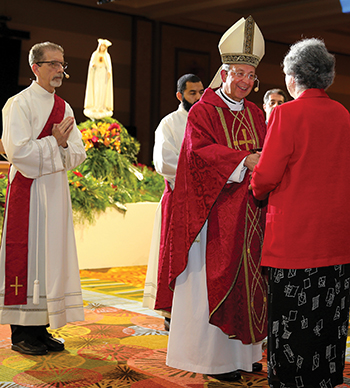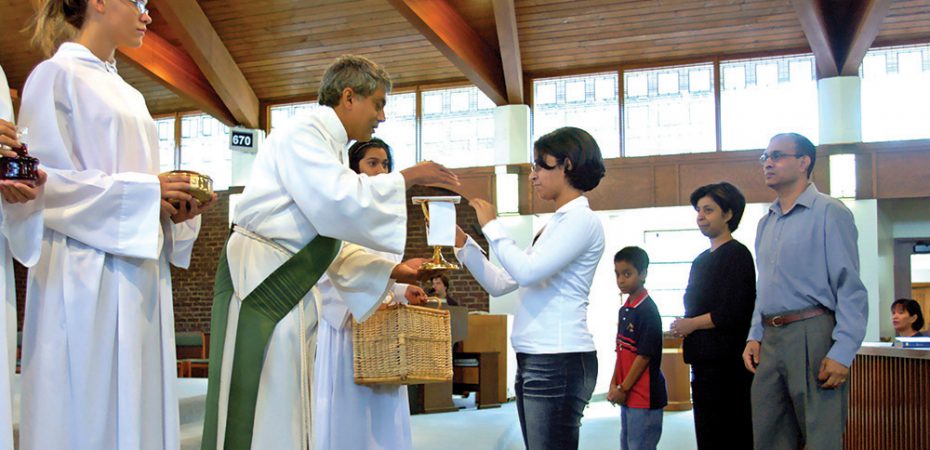Preparation of the Gifts
A deacon stands at the threshold between liturgy and the world
David W. Fagerberg Comments Off on Preparation of the Gifts
Speaking as a layman on behalf of my fellow laity, I think we are becoming more acquainted with deacons as we see more and more of them. We are also becoming more acquainted with what they do. Their ministry outside the Mass is more invisible to us, but inside the Mass we see them doing the tasks assigned by the General Instruction of the Roman Missal.
At the celebration of the Eucharist, they are instructed to assist the priest, proclaim the Gospel, sometimes preach, guide the faithful by appropriate instructions, announce the intentions of the universal prayer, distribute Communion and purify the sacred vessels.
In our mind’s eye we can picture the deacon at work during the Liturgy of the Word. But do we suffer the erroneous idea that he has no work to do during the Liturgy of the Eucharist because he is not the one making the consecration? Do we think he gets a short siesta between the universal prayer and the distribution of Communion?
I would like to highlight the significance of one particular responsibility of the deacon at the Eucharist, leaving the many others for another time. I refer to the preparation of the gifts. We overlook this ministry for two reasons, the very reasons for which we might sometimes overlook the deacon himself.
Deep Symbolic Meaning
First, we overlook the preparation of the gifts, because it seems to be merely functional, when it is deeply symbolic. The laity brought their gifts for the Eucharistic sacrifice from the earliest days of the Church, and these gifts were then transferred to the altar for consecration. But the deacon assists the presider in accepting the offerings of the people for more than a simple functional reason. He is not merely an extra pair of hands.
The U.S. National Directory for Formation, Ministry and Life of Permanent Deacons in the United States calls this ministry symbolic — it is “symbolic of his traditional role in receiving and distributing the resources of the community among those in need — and he helps to prepare the gifts for sacrifice” (No. 35).
In his ordained identity as an icon of Christ the Servant, the deacon stands at the threshold between liturgy and world. The Directory emphasizes this when it says the deacon represents the integral relationship “between the worship of God in the liturgy that recalls Jesus Christ’s redemptive sacrifice sacramentally and the worship of God in everyday life where Jesus Christ is encountered in the needy. The deacon’s service begins at the altar and returns there” (No. 37). Christians have a sacramental liturgy at the Mass and a spiritual liturgy of everyday life, and the deacon is involved with both.
Expressive Outside of the Liturgy
Second, if the preparation of the gifts is symbolic in the liturgy, it’s because what happens inside the liturgy is expressive of something that should be happening in a Christian’s life outside the liturgy. If the deacon’s duty includes “the preparation of the gifts,” perhaps that ministry begins before Sunday morning.
This idea came to me from a recent book titled “The Redeemer’s Call to Consecrated Souls” (Logos Institute Press, $12.95). The author is anonymous; the convent from which she wrote is also unknown. All we know is that she was a religious sister in France writing in the 1930s. She writes for her sisters in consecrated life, but I find every page applicable to Christians in the world, too, because she writes in the voice of Jesus, as if he is speaking to believers.
………………………………………………………………………………………………………………………………………………………………..
Hallmark of faithfulness
“The deacon’s service begins at the altar and returns there. The sacrificial love of Christ celebrated in the Eucharist nourishes him and motivates him to lay down his life on behalf of God’s People.”
— National Directory for the Formation, Ministry and Life of Permanent Deacons in the United States, No. 37
…………………………………………………………………………………………………………………………………………………………………

Here is what Jesus says to us: “I still want to save this poor world, I always want to. Is that not the reason why my Father sent Me to the Cross, and why each day He sends Me back into the Host?” It is an arresting way to describe Jesus’s three comings: he came in the flesh, he will come at the end of time and he daily comes to us in the Host.
“What indeed is my Host if not the ongoing life of the Crucified Savior,” he says in “The Redeemer’s Call.” Jesus is not absent; his ascension was not a departure; he has not forgotten his flock. He wants us to have his life, and to live his life in us, as Paul realized with a gasp: “Yet I live, no longer I, but Christ lives in me” (Gal 2:20). The Christian dies daily and lives a hidden life with Christ in God through baptism. We, therefore, join Jesus in his sacrifice. He says in “The Redeemer’s Call,” “Become host, more and more, in order to ever enlarge my Host.”
In the Eucharistic dialogue, a dialogue of love, we are sacrificed with Christ. We read in “The Redeemer’s Call”: “May love give you to the Host. … May the return of love by your hearts transform you into hosts.” Each new Communion is growth in a life of charity, which is “not only Eucharistic Communion but also spiritual communion with my Will.”
The Host gives us love and stirs the life of charity. The Host wants to be joined by hosts. If it is true of the deacon that “he helps to prepare the gifts for sacrifice,” let it describe not only what he does during the Mass, let it also describe his ministry leading up to Mass: His spiritual ministry is to prepare hosts to join the Host.
Encouragement
Becoming a sacrificial victim alongside Christ can be frightening, so the deacon’s ministry is one of encouragement. Joining our lives to Christ’s is not something the world teaches, so the deacon’s ministry is one of instruction. Suffering is the crucible wherein Jesus forms his hosts into himself, so the deacon’s ministry is one of succor.
A deacon is a spiritual man, a man with a spiritual ministry, which is to say a ministry that derives from the Holy Spirit. That is why an epiclesis is prayed over deacons at their ordination: “Lord, we beg you, send forth upon them the Holy Spirit, that they may be strengthened by the gift of your sevenfold grace to carry out faithful the work of the ministry.” The spiritual man ministers to spiritual souls so they can be prepared to come to communion. I don’t just mean prepared to show up and receive Communion, I mean coming into union with Christ.
Our nun writes, “There is no true, unifying communion without this encounter and fusion of two hosts, the one vanishing into the other, the little host into the Great Host, so that the reach of its redemptive activity may expand.”
I see two works of the deacon in what she says. “Expanding the reach of Christ” is a nice way to describe the diaconate, since deacons are “more present and active in the secular world than priests” (Catechesis of St. John Paul II). And “the fusion of two hosts” is a nice way to describe the deacon preparing Christians to join Christ’s sacrifice. The deacon prepares Christians for the mystery of vanishing into Christ.
DAVID W. FAGERBERG is professor of liturgical theology at the University of Notre Dame.
………………………………………………………………………………………………………………………………………………………….
Preparation of the Gifts
The U.S. bishops lay out the role of the deacon at the preparation of the gifts in their publication “The Deacon at Mass”:
“After the Universal Prayer, while the priest remains at the chair, the deacon prepares the altar, assisted by the acolyte(s), but the care of the sacred vessels belongs to the deacon. He assists the priest in receiving the people’s gifts in a suitable place.
“Next, he hands the priest the paten with the bread to be consecrated, pours wine and a little water into the chalice saying inaudibly: ‘By the mystery of this water and wine … ’ then passes the chalice to the priest. He may also make this preparation of the chalice at the side table.
“If incense is used, the deacon assists the priest with the incensation of the gifts, the cross and the altar; afterward he, or the acolyte, incenses the priest and the people (see General Instruction of the Roman Missal, No. 178).”
…………………………………………………………………………………………………………………………………………………………..





